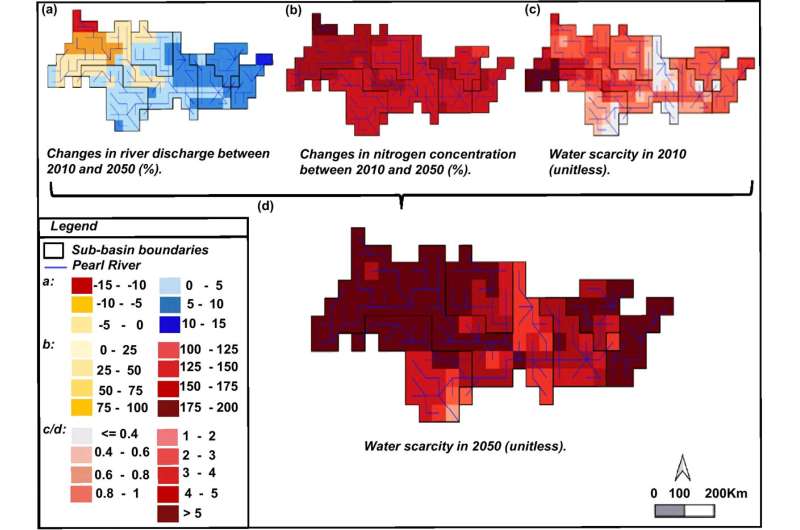This article has been reviewed according to Science X's editorial process and policies. Editors have highlighted the following attributes while ensuring the content's credibility:
fact-checked
peer-reviewed publication
trusted source
proofread
Efficient water quality management could reduce future water scarcity by half

Global water scarcity, a result of both quantity and quality change, challenges the achievement of the Sustainable Development Goals. An international team of researchers has now developed a novel modeling approach to identify cost-effective combinations of water management, promising a substantial reduction in future water scarcity.
More than half of the world's population lives in areas where water is limited and/or too polluted. This poses a challenge to the balance between water supply and demand, and causes economic risk for sectors that use water, such as energy, agriculture, households, and industry. In addition, water pollution, such as elevated nitrogen levels, can lead to severe health issues.
The digital transformation of the water sector is crucial for resource management and sustainability. Smart technologies like remote sensors, smart irrigation, and digital twins enable real-time monitoring and efficient water use. However, funding gaps remain, with the water sector receiving less than 1% of climate-tech investments, according to the World Economic Forum.
"Our challenge lies in effectively mitigating water scarcity, ensuring sufficient water of good quality to fulfill human, environmental, social, and economic demands, and support sustainable development," notes Taher Kahil, Water Security Research Group Leader in the IIASA Biodiversity and Natural Resources Program.
"Our study introduces a new modeling method that combines a nutrient model with a cost-saving procedure, considering the effects of biogeochemistry, climate change, and human activities on land in a detailed and specific way."
The study, published in Nature Communications, highlights that current research on water scarcity often focuses on water quantity, overlooking water quality.
"Investing in reducing water pollution offers a cost-effective strategy to alleviate future water scarcity. We looked at this issue within the context of the Pearl River Basin in China, an area highly stressed by water scarcity and pollution, considering different socioeconomic and climate change scenarios," explains Maryna Strokal, one of the study corresponding authors and Associate Professor at Wageningen University & Research.
"We looked at water quality management options such as reducing chemical fertilizers use and treating wastewater, as well as water quantity options like water storage and water-saving techniques," says Strokal.
Results show that future water scarcity in 2050 is expected to increase by a factor of four in most parts of the Pearl River Basin under a scenario with high economic development and global warming. The researchers demonstrate that implementing water quality management measures could halve future water scarcity in the Pearl River Basin.
"Water scarcity is one of the major environmental problems in the world. Our analysis can serve as a blueprint for assessing water scarcity in other heavily water stressed and polluted river basins, guiding the development of cost-effective strategies to mitigate water scarcity in alignment with the Sustainable Development Goals," concludes Kahil.
More information: Safa Baccour et al, Water quality management could halve future water scarcity cost-effectively in the Pearl River Basin, Nature Communications (2024). DOI: 10.1038/s41467-024-49929-z
Journal information: Nature Communications




















